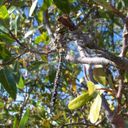Blue-eyed Darner
Rhionaeschna multicolor
Classification
- Phylum: Arthropoda
- Subphylum: Hexapoda
- Class: Insecta
- Order: Odonata
- Suborder: Anisoptera
- Family: Aeshnidae
- Genus: Rhionaeschna
- Species: multicolor
Pronunciation
How to pronounce Rhionaeschna multicolor: /ɹaɪoʊˈnɛsknə ˌmʌltɪˈkoʊlɚ/
These audio files are automatically generated. While they are not always 100% accurate, they are a good starting point.
Images






Summary
The blue-eyed darner (Rhionaeschna multicolor), is a large dragonfly common in western North America, recognizable by its bright blue eyes and distinct body markings. It frequents various aquatic habitats and is noted for its migratory behavior in some regions.
Physical Characteristics
The blue-eyed darner is a large species with a length of 65–70 mm (2.6–2.8 in). Males have bright blue eyes and a dark brown to brownish black body, while females have a similar body pattern, but with a brown base color and green markings.
Identification Tips
Males are distinguishable by their forked anal appendages and the characteristic blue stripes on the thorax. The abdomen features both large and small blue spots, while females have similar marks but with different base colors.
Habitat
Occurs near a variety of water bodies including lakes, ponds, slow-moving streams, canals, and marshy areas, especially in open rather than wooded regions. May be found in urban settings far from water.
Distribution
Native to western North America, ranging from central Canada and the Dakotas south to west Texas and Oklahoma, and extending into Central America as far south as Panama.
Diet
Hunts small flying insects while on the wing.
Life Cycle
Emerges in spring, usually the second earliest darner, with some migratory behavior observed in California.
Reproduction
Males patrol over open water, copulating couples seek perches in high waterside trees. Females lay eggs among dense emergent plants and floating debris.
Ecosystem Role
Predator of small flying insects, contributing to the balance of local insect populations.
Tags
- dragonfly
- Rhionaeschna multicolor
- Aeshna multicolor
- Odonata
- Aeshnidae